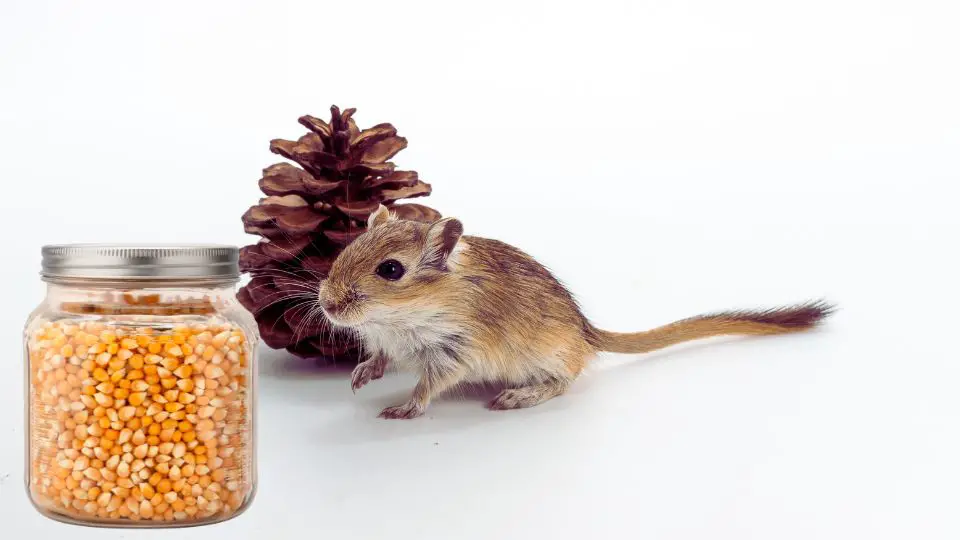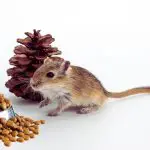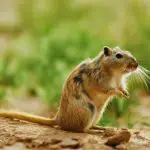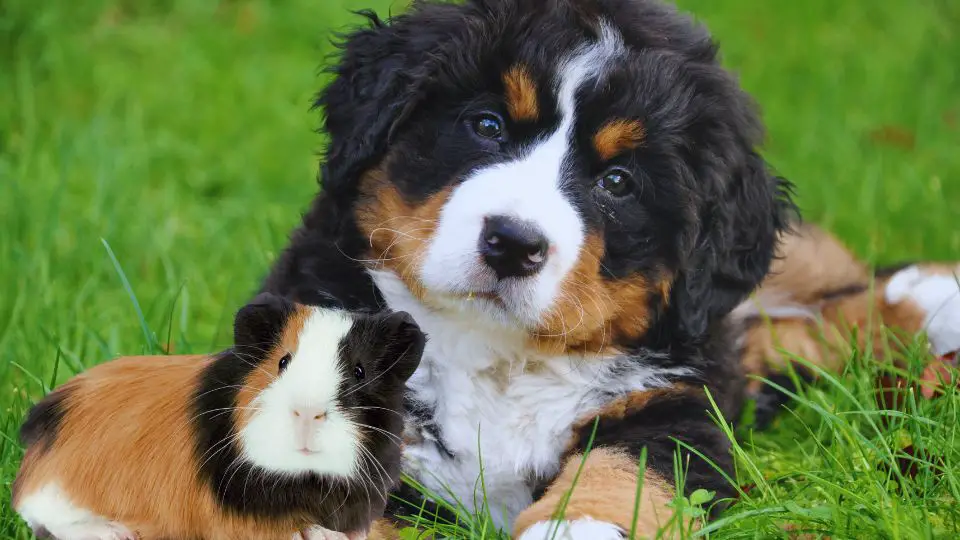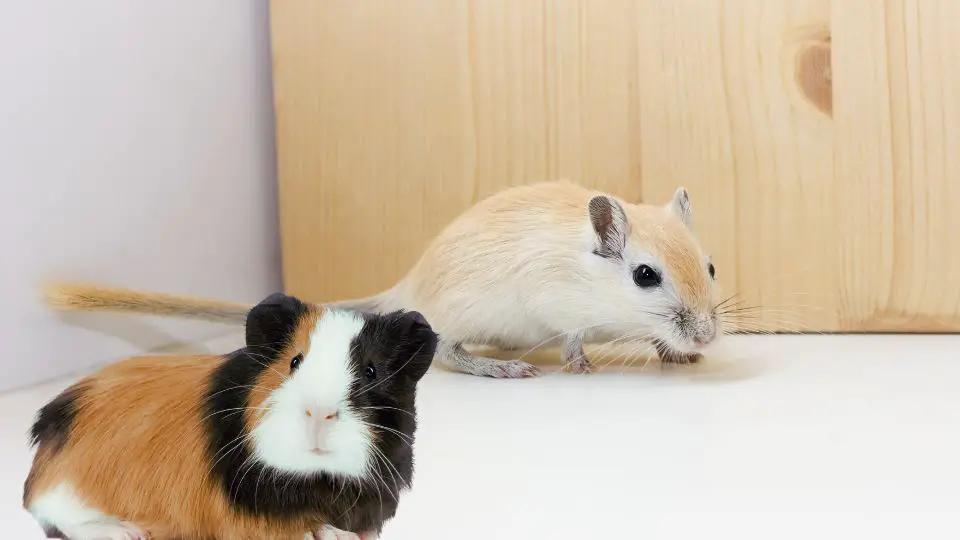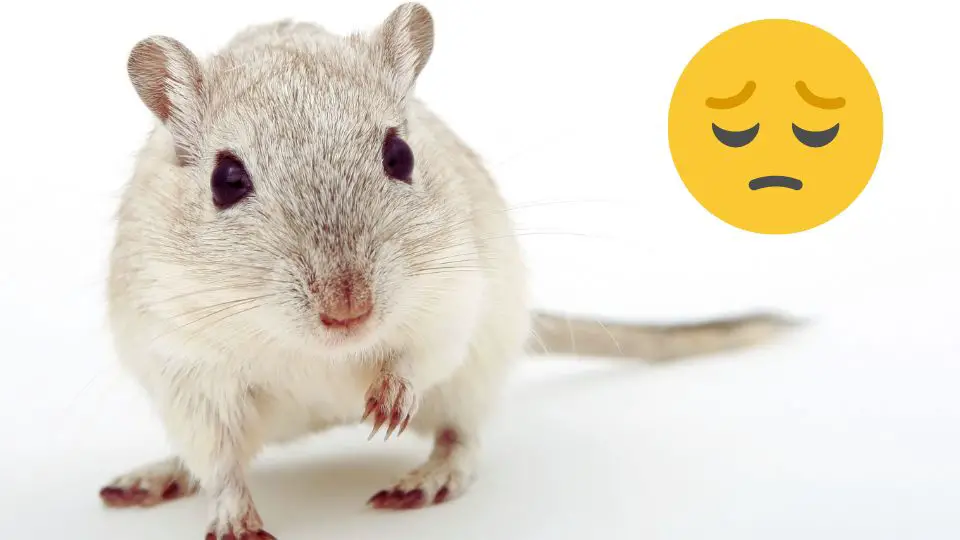Gerbils are curious little creatures, and as pet owners, we often wonder what types of foods are safe and suitable for them. Popcorn kernels, with their light and crunchy texture, might seem like a tempting treat to share with your gerbil.
But no, gerbils should not eat popcorn kernels.
In this article, we will explore the topic of gerbils and popcorn kernels to help you make an informed decision about your pet’s diet.
Gerbil Dietary Needs and Digestive System
In the wild, gerbils are omnivorous, meaning they consume a combination of plant-based and animal-based foods. Their natural diet consists of a variety of seeds, grains, grasses, and occasionally insects. This diverse diet provides them with the necessary nutrients, including proteins, carbohydrates, fats, vitamins, and minerals, to support their growth and energy requirements.
To ensure optimal health, it is important to replicate their natural diet as closely as possible in captivity. Gerbils have specific nutritional requirements that should be considered when selecting their food. Here are some key components of their diet:
- High-Quality Pellets: Gerbil-specific pellets serve as a foundation for their diet. These pellets are specially formulated to provide a balanced blend of essential nutrients, vitamins, and minerals.
- Fresh Vegetables and Herbs: Gerbils can benefit from the addition of fresh vegetables and herbs to their diet. Offer a variety of options such as leafy greens (spinach, lettuce), carrots, bell peppers, and herbs like parsley or basil. These foods provide additional fiber and essential vitamins.
- Occasional Treats: Treats can be given in moderation to provide enrichment and variety. Suitable options include small amounts of fresh fruits (such as apple or berries), dried herbs, or gerbil-specific treat mixes available from reputable pet stores. Avoid treats high in sugar, salt, or fat, as they can be harmful to their health.
Gerbils have a relatively efficient digestive system adapted to their natural diet. Their digestive tract consists of the mouth, esophagus, stomach, small intestine, cecum, and large intestine. Notable features of their digestive system include:
- Efficient Herbivorous Digestion: Gerbils have a specialized digestive system that allows them to efficiently extract nutrients from fibrous plant material. Their cecum, a part of the large intestine, contains bacteria that aid in the breakdown of cellulose, a complex carbohydrate found in plant matter.
- Limited Ability to Digest Complex Proteins: Gerbils have a limited ability to digest complex proteins, such as those found in meat or dairy products. Therefore, their diet should primarily consist of plant-based foods and appropriate sources of protein.
- Water Intake: Gerbils have a low water requirement due to their desert-dwelling nature. However, it is important to provide fresh, clean water at all times to ensure proper hydration.
Understanding the dietary needs and digestive system of your small pet is crucial for their overall health and well-being.
Popcorn Kernels: Nutritional Content and Potential Risks
Popcorn kernels primarily consist of carbohydrates, fiber, and trace minerals. Carbohydrates are the main source of energy, while fiber supports digestive health. Trace minerals, such as magnesium and manganese, are present in small amounts and contribute to overall nutrition.
While popcorn kernels may be a popular snack for humans, they are not recommended for gerbils due to the potential risks associated with their hard texture and choking hazards.
Potential Risks and Concerns
While popcorn kernels may seem like a harmless snack, there are several risks and concerns to consider when it comes to feeding them to gerbils:
- Hard Texture: Popcorn kernels have a hard and dense texture, which can be challenging for gerbils to chew and digest. Their small size and delicate teeth are not well-suited for breaking down hard kernels, potentially leading to dental issues or discomfort.
- Choking Hazards: The small size and irregular shape of popcorn kernels pose a choking hazard for gerbils. If a kernel becomes lodged in their throat, it can cause respiratory distress and other serious complications.
- Unpopped Kernels: It’s important to note that not all popcorn kernels pop when heated. Unpopped kernels can be even harder and riskier for gerbils to consume. Accidental ingestion of an unpopped kernel can lead to tooth damage or gastrointestinal blockages.
- Seasonings and Additives: Popcorn often comes with various seasonings, butter, or salt, which can be harmful to gerbils. These additives can cause digestive upset and may contain ingredients that are toxic to small animals.
Impact on Digestion and Dental Health
Popcorn kernels have a hard outer shell that can be difficult for gerbils to digest. Their digestive system is not well-adapted to break down hard substances like popcorn kernels. If a gerbil consumes popcorn kernels, the hard shells may pass through their digestive tract largely undigested, which can lead to digestive discomfort or even gastrointestinal blockages.
Gerbils have constantly growing incisors, and their diet plays a crucial role in maintaining their dental health. Popcorn kernels, with their hard texture, pose a risk to gerbil teeth. Attempting to chew on popcorn kernels can potentially cause dental fractures or abrasions, leading to dental problems and discomfort.
The risk of dental damage is particularly high if the gerbil chews on unpopped kernels, which are even harder than popped ones. The force required to bite into these hard kernels can exceed the limits of a gerbil’s teeth, potentially resulting in broken or injured teeth.
While popcorn kernels may be a tempting snack, they pose potential risks to gerbil digestion and dental health. The hard shells can be challenging to digest, and the hard texture can cause dental damage.
Alternatives to Popcorn Kernels
If you’re looking for safe and enjoyable treats to offer your gerbil, it’s important to consider alternatives to popcorn kernels. Here are our recommendations:
- Gerbil-Specific Treats: One of the best options is to choose treats that are specifically formulated for gerbils. These treats are designed to meet their nutritional needs and are made from ingredients that are safe for gerbils to consume. They come in a variety of flavors and textures, providing a satisfying snack for your furry friend.
- Fresh Fruits and Vegetables: Fresh fruits and vegetables are excellent alternatives to popcorn kernels. Offer small portions of fruits and vegetables that are safe for gerbils to consume, such as apple slices, carrot sticks, or cucumber pieces. These options provide natural flavors and textures that can be enjoyable for gerbils while also offering essential vitamins and minerals.
- Gerbil-Safe Seeds and Grains: Gerbils naturally enjoy seeds and grains in their diet. Offer small amounts of gerbil-safe seeds and grains as treats. Some examples include sunflower seeds, pumpkin seeds, millet, or rolled oats. These treats can provide a satisfying crunch while adding variety to your gerbil’s diet.
- Hay Cubes: Hay cubes are compressed blocks of hay that can be a great treat for gerbils. They provide a satisfying chewing experience while promoting dental health. Ensure the hay cubes are specifically designed for small animals like gerbils.
- Gerbil Chews and Toys: Consider providing your gerbil with chew toys made from safe materials. Chew toys designed for small animals can help satisfy their natural chewing instincts while promoting dental health. These toys are often made from wood or other safe materials that gerbils can nibble on without risk.
Conclusion
In conclusion, while popcorn kernels may be a favorite snack for many of us, they are not suitable for gerbils. The hard texture and potential choking hazards make popcorn kernels a risky choice for these small rodents. It’s important to prioritize the safety and well-being of your gerbil by providing them with a balanced and appropriate diet.
Instead of popcorn kernels, consider offering safe alternatives such as gerbil-specific pellets, fresh vegetables, or other treats specifically formulated for their dietary needs. If you have any concerns or questions about your gerbil’s diet, consult a veterinarian experienced in small animal care who can provide tailored advice and guidance. By making informed choices about your gerbil’s diet, you can ensure they lead a healthy and fulfilling life.

